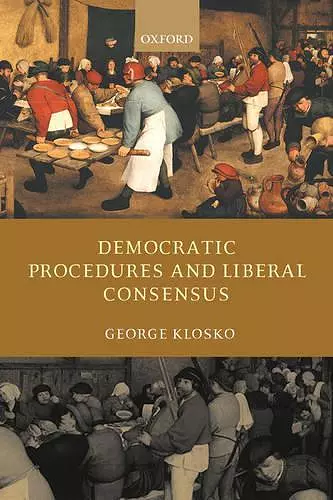Democratic Procedures and Liberal Consensus
Format:Hardback
Publisher:Oxford University Press
Currently unavailable, and unfortunately no date known when it will be back
This hardback is available in another edition too:
- Paperback£52.00(9780199270200)

Liberal theory seeks agreement on political principles in spite of the moral, religious, and philosophical diversity of contemporary societies. Democratic Procedures and Liberal Consensus breaks new ground in developing principles from research on liberal citizen's attitudes towards rights and liberties, distributive justice, procedural justice, and religious beliefs. Because liberal citizens do not generally accept strong individual rights or strongly egalitarian principles of distributive justice, the principles of liberal consensus must be based on almost universal support for democratic political systems and democracy as a value. The details of central liberal principles, including those bearing on democracy itself, must be worked out by appropriate democratic procedures.
Democratic Procedures and Liberal Consensus provides an excellent example of political theorising worthy of emulation. Klosko should be applauded for producing a study that is not only engaging and insightful, but also original and a valuable contribution to both the existing literature concerning the character of a viable conception of political liberalism and, more generally, the ongoing debate surrounding the nature of an appropriate conception of justice for contemporary pluralistic societies. Shaun P Young, European Journal of Political Theory, June 2003
Fills a gap between John Rawls's A Theory of Justice and Alan Wolfe's One Nation after All ... includes an excellent, albeit brief, theoretical discussion of empirical research ... This work is well suited for graduate and political theorists interested in contemporary liberalism. * Perspectives on Political Science *
Klosko's argument is very rich, in both the multitude of deep theoretical questions it tackles and the wealth of social science research it draws upon ... Klosko's work does a wonderful job of starting to fill the empirical vacuum in which normative theory proceeds, thus opening the door for the subsequent development of empirically astute accounts of liberal justification. * Journal of Politics *
This study overall sets a fine example of how normative political theory might in particular, and must in general, engage with the messy facts of the real world, a world whose citizens are not the ideal deliberators nor completely reasonable individuals an idealized liberalism would wish them to be. * Philosophy *
The originality and attraction of his [Klosko's] study is that it is a work of normative political philosophy solidly rooted in empirically well established facts about the beliefs and values of actually existing citizens. * Philosophy *
Makes a contribution to recent debate over liberal political theory ... thoughtful discussion of empirical research. * Choice *
Klosko's book is informed by both political philosophy and empirical work on religion ... it is a most welcome and admirable contribution. * Ethics *
Klosko's argument is throughout careful and lucid. * Political Studies *
ISBN: 9780198292340
Dimensions: 241mm x 163mm x 20mm
Weight: 557g
282 pages